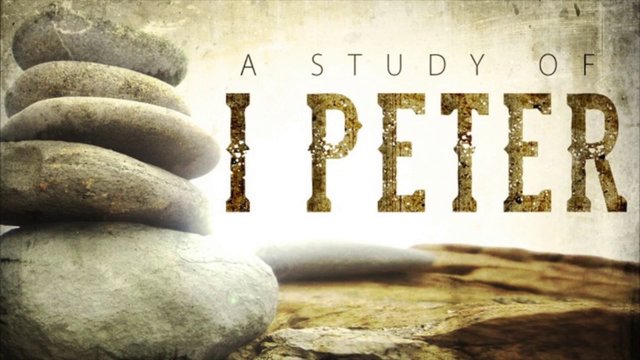I am excited to begin our discussion of 1 Peter tonight. Please read 1 Peter 1 for tonight. Pastor Joshua Sorrows will be leading our discussion this evening. He is a good friend of mine and the pastor at Harvest Church in Conway. I thought it good for us to have a different perspective on the Scriptures.
A Call to Holiness: (vv.13-16)
Peter begins his letter in vv. 3-10 by reminding his audience to be blessed by God and to rejoice in Jesus Christ. The result of this blessedness (“Therefore” Peter writes) is that we are to “be holy, as I am holy.” vv. 13, 16; Lev. 11:45. Being holy is our response to the salvation given to us in Jesus Christ. Peter is not telling his audience to return to obedience to the law or a particular moral code. God has already shown Peter that obedience to the Old Testament law is not required of a follower of Jesus. See, Acts 10, Gal. 2:11-21. Rather, he is encouraging us that if we truly believe that “we have been born anew to a living hope through the resurrection of Jesus Christ from the dead” (v.1:3) then our lives and our manner of living should reflect this truth.
Peter begins this exhortation by telling his audience to “gird up their minds.” In the Hebrew Scriptures, to “gird your loins” means to tuck your tunic into a girdle so that the tunic is tight against your body and off the ground in order to prepare for hard work or battle. (An illustration of how to do so is here.) This phrase was specifically used as a direction at the Passover (Ex. 12:11) and to describe the coming Messiah (Isa. 11:5). Therefore, to gird your mind is to prepare for a difficult task but one for which the Messiah has prepared us.
The task before us is to not be conformed (i.e. molded) to the passions and desires of this world. Paul lists these passions as the “works of the flesh” in Galatians 5:19-21 – fornication, impurity, licentiousness, idolatry, sorcery, enmity, strife, jealousy, anger, selfishness, dissension, party spirit, envy, drunkenness, and carousing. Later in this discourse, Peter says to put away all malice, guile, insincerity, envy, and slander. 1 Peter 2:1. If our hope lies in the things of this world or in ourselves, these passions and desires are the natural results. However, if our hope lies above, these things are put away. How can we be envious or jealous of transient things? How can we behave contentiously and divisively with slander and malice if we are conformed to Jesus Christ?
The Ransom of Christ: (vv.13-25)
Peter continues his appeal to a holy life by reminding his audience that we have been “ransomed” by the blood of Christ from the futile and perishable ways of this world. v.1:18. We see this idea of Christ’s blood as a ransom in the teachings of Jesus (Matt. 20:28), Paul (1 Tim. 2:6), John (Rev. 5:9), and the Psalmist (Ps. 49:6-8). In the ancient world, a person could be enslaved for debts, a civil wrong, or by being captured in war. This person could be redeemed or set free by a ransom payment. See, Ex. 21:30, Lev. 25:48. Through Adam, we are enslaved to sin and death (Rom. 6) and the futile ways of this world (1 Pet. 1:18). At the cross, Christ is handed over to death and futility in order to secure our release. (If you are familiar with The Lion, the Witch, and the Wardrobe, Anslan is ransomed over to the White Witch to secure Edmond’s release.)
For Peter, we are ransomed from “Futility.” The Greek word for “futile” is mataios which means the absence of purpose, aimlessness, ineffectual, unproductive, and vain. “The grass withers and the flower falls” (v.1:24) describes the aimlessness of this world. This word stands in opposition to the Greek teleios meaning completeness or perfection. See, Matt. 5:48. By growing in salvation, we come to reject the futilities of the world, and inherit “the word of the Lord that abides for ever.” v.1:25. And this transition from futility to perfection is made possible through the ransom of Christ’s blood.
Love: (v.22)
Having answered the call of being holy as God is holy and entering into the transition from futility to perfection all through the precious blood of Christ, the result is a “genuine mutual love for one another.” v.22. Love is the essence of holy behavior. We are to be holy, as God is holy, and God is love. Peter’s letter may lack a great discourse on love as found in 1 John 4 or 1 Corinthians 13, but in this verse and elsewhere in his letter (4:8), he tells us of the centrality of love within the life of a Christian and within a Christian community. Love is where we find our completeness and perfection.
Dinner is at 6. The menu is meatball subs and Ceasar salad. Discussion about 6:45. Compline around 8. All you need for tonight is a bible, and if you do not have one, one will be provided for you. Hope to see you here!
And the ransomed of the Lord shall return,
Isaiah 51:11
and come to Zion with singing;
everlasting joy shall be upon their heads;
they shall obtain joy and gladness,
and sorrow and sighing shall flee away.


Pingback: 2 Peter 3, The Conclusion – Ancient Anglican